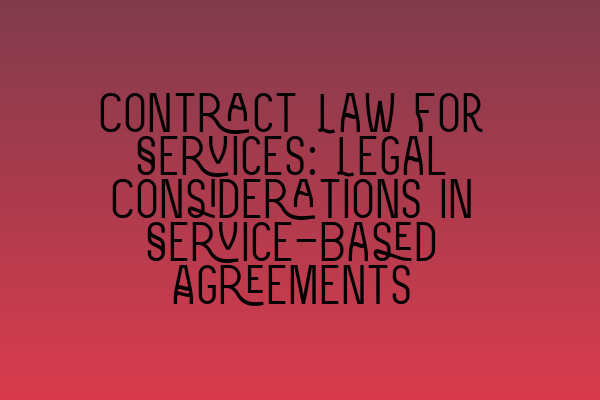Contract Law for Services: Legal Considerations in Service-Based Agreements
As a solicitor specializing in contract law, I often come across service-based agreements that require careful consideration and thorough understanding. Contract law plays a crucial role in ensuring that both parties involved in a service agreement are protected and their rights and obligations are clearly defined. In this blog post, I will discuss some of the key legal considerations that need to be taken into account when drafting and negotiating service-based contracts.
1. Essential Terms and Conditions:
When drafting a service-based agreement, it is essential to include all the terms and conditions that will govern the relationship between the service provider and the client. This includes details such as the scope of services, duration of the agreement, payment terms, confidentiality provisions, termination rights, and any dispute resolution mechanisms. These terms should be clearly spelled out to avoid any ambiguity or misunderstandings.
2. Service Description:
A comprehensive and accurate description of the services to be provided is essential to set clear expectations for both parties. The description should outline the specific deliverables and milestones, as well as any limitations or exclusions. This will help avoid disputes regarding the quality or quantity of services provided.
3. Payment Terms:
Clearly defining the payment terms is crucial to avoid any misunderstandings and ensure that the service provider is compensated fairly for their services. It is important to specify the fees, payment schedule, and any additional costs associated with the services rendered. This will help prevent any payment-related disputes down the line.
4. Intellectual Property Rights:
In service-based agreements, intellectual property rights often come into play. It is essential to address ownership and usage rights of any intellectual property created during the provision of services. This includes copyrights, trademarks, patents, and trade secrets. Clear agreements on these rights will help protect both parties’ interests.
5. Liability and Indemnity:
Including provisions that address liability and indemnity is crucial to allocate the risks involved in providing services. This will determine who will be responsible for any loss, damages, or claims arising from the provision of services. It is important to clearly define the extent of liability and the indemnification obligations of each party to avoid any disputes.
6. Termination and Breach:
Service-based agreements should include provisions that outline the circumstances under which either party can terminate the agreement, as well as the consequences of breach. These provisions should include notice periods, remedies for breach, and any penalties or liquidated damages clauses. This will help protect the parties’ interests and provide a clear roadmap for termination or dispute resolution.
7. Governing Law and Jurisdiction:
Specifying the governing law and jurisdiction of the agreement is essential to determine which laws will govern the interpretation and enforcement of the agreement. It is advisable to choose a legal jurisdiction that is favorable to both parties or that has a connection to the service provided. This will help streamline any legal proceedings in the event of a dispute.
In conclusion, when entering into a service-based agreement, it is crucial to consider the legal aspects to protect the interests of all parties involved. This includes ensuring that all essential terms and conditions are included, accurately describing the services to be provided, defining payment terms, addressing intellectual property rights, allocating liability and indemnity, and carefully addressing termination and breach provisions. By considering these legal considerations, both service providers and clients can enter into a contract with confidence, knowing that their rights and obligations are well-defined and protected.
If you’re preparing for the SQE 1 or SQE 2 exams, be sure to check out our related articles:
– SQE 1 Practice Exam Questions
– SQE 1 Practice Mocks FLK1 FLK2
– SQE 2 Preparation Courses
– SQE 1 Preparation Courses
– SRA SQE Exam Dates
At SQE Contract Law, we offer expert guidance and preparation resources for the SQE exams. Our team of experienced solicitors can help you succeed in your legal career. Contact us today to learn more about our services.
